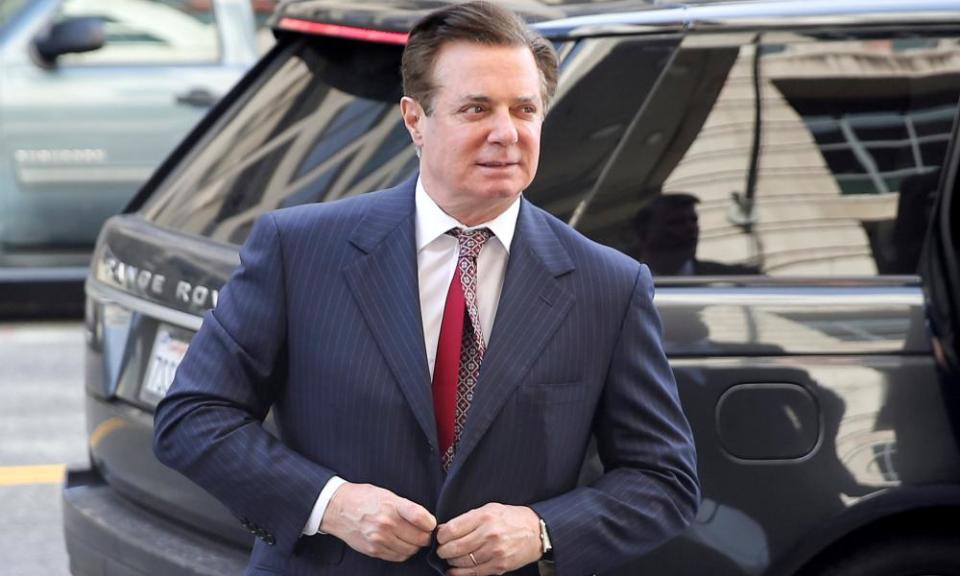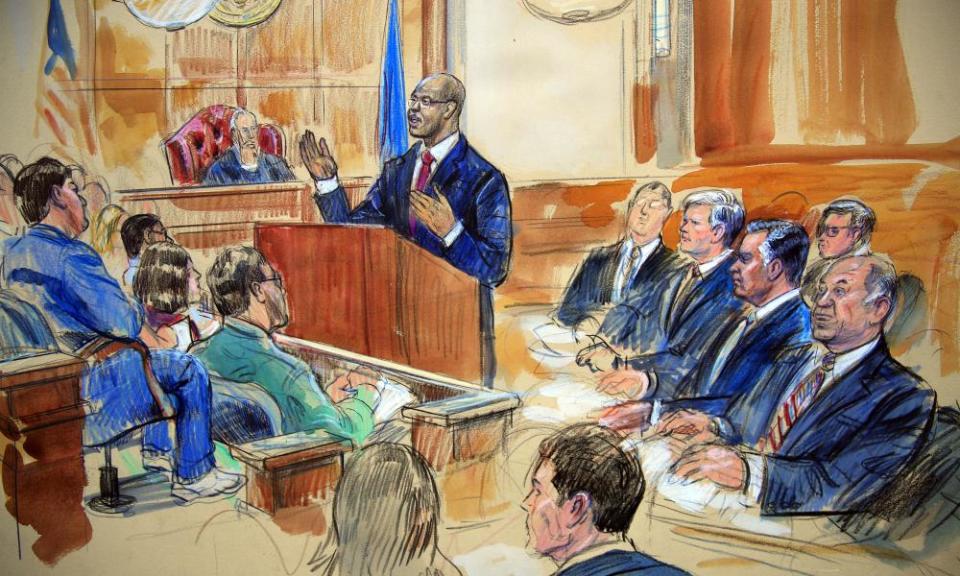Manafort put himself 'above the law' to fund his expensive tastes, court hears
Defence in trial of Trump’s former campaign chair claims his deputy, Rick Gates, betrayed him

Donald Trump’s former campaign chairman Paul Manafort put “himself and his money above the law” to bankroll a lavish lifestyle that included a $21,000 watch and a $15,000 jacket made from ostrich, a court heard on Tuesday.
“As the old adage goes, just follow the money,” assistant US attorney Uzo Asonye told the jury on the first day of the lobbyist and political consultant’s trial on 18 charges of bank fraud and tax evasion.
But Manafort’s defence sought to shift blame to his deputy, Rick Gates, and attempted to cast doubt on his forthcoming evidence by claiming that he betrayed Manafort’s trust and “had his hand in the cookie jar”.
The arguments were heard on the first day of the first trial arising from Robert Mueller’s investigation into alleged collusion between Trump’s presidential campaign and Russia. Mueller was not present in the courtroom in Alexandria, Virginia, and Trump’s name was not mentioned.
Even so, a pin could have been heard to drop as Asonye embarked on his opening statement. “A man in this courtroom believed the law did not apply to him,” he said, as Manafort looked on without expression. “No tax law, no banking law.”
The evidence gathered by Mueller’s team would show that Manafort funneled more than $60m in proceeds from his Ukrainian political consulting through offshore accounts and had hidden a “significant” portion of it from the IRS, the prosecutor continued. It funded multiple luxury homes, fast cars and “fancy clothes” worth half a million dollars.
That “secret income” had been used to pay for personal expenses such as a $21,000 watch, a $15,000 jacket made of ostrich and more than $6m worth of property paid for in cash, Asonye said. “He got whatever he wanted.”
The US district judge TS Ellis III interjected: “It isn’t a crime to have a lot of money and be profligate in your spending.”
But the evidence would show that Manafort had submitted false tax returns, committed bank fraud more than once and submitted fake documents or got others to do it for him, Asonye alleged. He had allegedly opened 30 bank accounts in three foreign countries to “receive and hide” his income. It came down, Asonye said, to one issue: “Did Paul Manafort lie?” He added: “Paul Manafort placed himself and his money above the law.”
From 2005 onwards, the court heard, Manafort worked for politicians and oligarchs in Ukraine and received payments through shell companies. But when Manafort’s “golden goose” client, the former Ukrainian president Viktor Yanukovych, fell from power in 2014, the money dried up and Manafort’s web of deceit expanded to compensate.
Whatever role subordinates played, Asonye contended, the “shrewd” Manafort was the one issuing orders and was the beneficiary. “Paul Manafort lied to his bookkeeper, he lied to his tax preparer, he lied to the IRS, he lied to multiple financial institutions – all in order to get and keep money.”
The defence lawyer Thomas Zehnle said in his opening statement that Manafort had trusted others to keep track of the millions of dollars he was earning from his Ukrainian political consultancy work. He left little doubt that the defence strategy hinges on shattering the credibility of Gates, who also worked as an aide on Trump’s election campaign and cut a plea deal with Mueller this year.

“Rick Gates had his hand in the cookie jar and he couldn’t take the risk his boss would find out,” Zehnle said.
“Manafort relied on Gates and others, including a professional accounting firm, to keep tabs on the money,” he continued. “Money’s coming in fast. It’s a lot, and Paul Manafort trusted that Rick Gates was keeping track of it … That’s what Rick Gates was being paid to do. Again, the evidence is going to show you Paul’s trust was misplaced.”
Gates embezzled millions of dollars from his longtime employer, Zehnle alleged, and “continued to make false statements” even up to the time he pleaded guilty and agreed to cooperate. “Rick Gates, you will learn, violated one of life’s most basic rules: when you’re in a hole, stop digging.”
Zehnle warned the jury to consider carefully what motives Gates might have for giving evidence as the government’s star witness. “The foundation of the special counsel’s case against Paul Manafort rests squarely on the shoulders of this one person.”
Zehnle disputed prosecutors’ claim that Manafort was trying to hide his earnings by storing money in bank accounts in Cyprus. He said this was the preferred method of payment of the supporters of the pro-Russia Ukrainian political party who were paying his consulting fees. “Paul Manafort did not intentionally deceive or mislead the IRS about his income ... US citizens are not prosecuted for mistakes in their tax returns.”
The government, he suggested, had “rushed to judgment” in bringing the case.
The first witness called was not Gates but Tad Devine, a political consultant who was Bernie Sanders’ chief strategist in the 2016 election and had previously worked with Manafort in Ukraine. The court was shown emails and invoices describing how both Manafort and Devine were paid hundreds of thousands of dollars for helping Yanukovych’s successful election campaign.
Devine reflected: “It was a tremendous amount of work and I have to say Paul worked harder than anybody.”
Manafort, 69, who has been jailed for nearly two months, looked drawn and stripped of the sheen of his public persona. He wore a black suit, white shirt and blue patterned tie and appeared actively engaged in proceedings, frequently conferring with his lawyers and making notes. At one point during jury selection he turned to give his wife a reassuring smile.
The trial is expected to last three weeks and Manafort has pleaded not guilty. He has a second trial scheduled for September in the District of Columbia. It involves allegations that he acted as an unregistered foreign agent for Ukrainian interests and made false statements to the US government.

